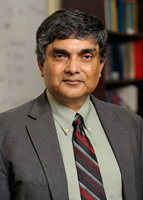Graduate Seminar Series
September 16, 2022
12:20 p.m. ET
Porter Hall - Room 100
September 16, 2022
12:20 p.m. ET
Porter Hall - Room 100
This talk will discuss the development of the Parametrically Upscaled Constitutive Model (PUCM) and the Parametrically Upscaled Crack Nucleation Model (PUCNM) for αα/ββ-phase Ti64 alloys. These thermodynamically consistent macroscopic constitutive models bridge spatial scales through the explicit representation of Representative Aggregated Microstructural Parameters (RAMPs), representing statistical distributions of morphological and crystallographic descriptors of the microstructure. The explicit representation of RAMPs, in macroscopic constitutive relations has important implications in structure-material design. The PUCNM is an indicator of the probability of crack nucleation in the local underlying microstructure. A genetic programming symbolic regression (GPSR)-based machine learning method operates on data-sets generated by image-based micromechanical crystal plasticity simulations to derive constitutive coefficients as functions of the RAMPs. The PUCM/PUCNMs development (both calibration and validation) uses data from microstructural characterization as well as mechanical tests, including constant strain-rate, creep, and strain-controlled dwell tests for the Ti64 alloy. Parametric study is conducted with the experimentally-validated PUCM and PUCNM to investigate the effect of RAMPs on dwell fatigue crack nucleation life. Finally, the combined PUCM/PUCNM tool is used for examining the impact of microstructure on fatigue crack nucleation in an engine blade model under simulated operating conditions. The results from these examples clearly exhibit the promise of the PUCM/PUCNM models in predicting fatigue crack nucleation in the microstructure of real structural applications, as well as demonstrating the microstructural influence.

Professor Somnath Ghosh is the Michael G. Callas endowed Chair Professor in the Department of Civil & Systems Engineering and Professor of Mechanical Engineering and Materials Science & Engineering at Johns Hopkins University. He is the founding director of the JHU Center for Integrated Structure-Materials Modeling and Simulation (CISMMS) and was the director/PI of the Air Force Center of Excellence in Integrated Materials Modeling (CEIMM). His research focuses on multi-scale structure-materials analysis and simulations, multi-physics modeling and simulation of multi-functional materials, materials characterization, process modeling, and emerging fields like Integrated Computational Materials Engineering (ICME). He has conducted pioneering research to advance the field of integrated computational structure-materials modeling into new areas of importance and challenges.
July 8 2025
1:00 PM ET
Materials Science and Engineering
"Uncovering the Driving Force of Thermal-Activated Grain Boundary Migration in Polycrystals," presented by Zipeng Xu
Doherty A310
July 29 2025
11:00 AM ET
Materials Science and Engineering
Graduate Programs Information Session
Learn more about the master's and doctoral programs in materials science and engineering at CMU.
August 13-15 2025
Materials Science and Engineering
Workshop on Methods for Three-Dimensional Microstructure Studies
The workshop is intended for researchers at all levels and will combine presentations on 3D microstructure science as well as practical presentations on the tools and methods for reconstructing, analyzing and synthesizing.
Scott Hall 5201 (Bosch Sparks Conference Room)